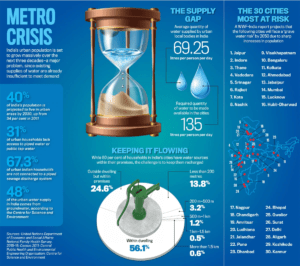Introduction
Water scarcity is one of the most pressing environmental issues facing India today. With a rapidly growing population, urbanization, and industrialization, the demand for water has surged, while the supply remains limited. India’s water crisis is a multifaceted problem that requires urgent and sustainable management strategies. This blog delves into the causes, impacts, and potential solutions for water scarcity in India.
The Causes of Water Scarcity in India
1. Population Growth
India’s population has surpassed 1.4 billion, leading to increased water consumption for domestic, agricultural, and industrial use.
2. Urbanization
Rapid urbanization has put immense pressure on existing water resources, with cities often struggling to provide adequate water supply to their residents.
3. Agricultural Demand
Agriculture accounts for about 80% of India’s water usage. Inefficient irrigation methods and water-intensive crops exacerbate the problem.
4. Industrialization
The expansion of industries has led to higher water consumption and pollution, further straining water resources.
5. Climate Change
Erratic rainfall patterns, prolonged droughts, and changing climate conditions have disrupted the natural water cycle, reducing the availability of water.
6. Pollution
Industrial discharge, agricultural runoff, and untreated sewage have contaminated many water bodies, making them unfit for use.
Impacts of Water Scarcity
1. Health Issues
Lack of clean drinking water leads to waterborne diseases such as cholera, dysentery, and typhoid, posing significant health risks.
2. Agricultural Challenges
Water scarcity affects crop yields, threatening food security and the livelihoods of millions of farmers.
3. Economic Consequences
Industries dependent on water face operational challenges, leading to economic losses and reduced productivity.
4. Social Unrest
Competition for limited water resources can lead to conflicts between communities, states, and even countries.
5. Environmental Degradation
Over-extraction of groundwater and depletion of rivers and lakes harm ecosystems and biodiversity.
Strategies for Water Management
1. Efficient Irrigation Techniques
Adopting drip and sprinkler irrigation systems can significantly reduce water wastage in agriculture.
2. Rainwater Harvesting
Encouraging the collection and storage of rainwater can augment water supply, especially in urban areas.
3. Wastewater Treatment and Reuse
Treating and recycling wastewater for industrial and agricultural use can alleviate pressure on freshwater resources.
4. Water-Smart Infrastructure
Developing infrastructure for better water distribution and reducing leakages can enhance water management.
5. Public Awareness and Education
Raising awareness about water conservation and promoting sustainable practices among citizens is crucial.
6. Policy and Governance
Strong regulatory frameworks and effective governance are essential for managing water resources sustainably. Integrated water resource management (IWRM) approaches can help in coordinated efforts.

Case Studies: Success Stories
1. Chennai’s Rainwater Harvesting Mandate
The city of Chennai made rainwater harvesting mandatory for all buildings, resulting in improved groundwater levels and reduced dependency on external water sources.
2. Maharashtra’s Jalyukt Shivar Abhiyan
This initiative focused on water conservation and management in drought-prone areas, enhancing groundwater recharge and improving agricultural productivity.
3. Rajasthan’s Traditional Water Conservation Methods
The revival of traditional water harvesting techniques like johads (small earthen check dams) has helped communities in Rajasthan manage water scarcity effectively.
Conclusion
Water scarcity in India is a critical issue that demands immediate and sustained action. By implementing efficient water management practices, embracing innovative technologies, and fostering community participation, India can navigate its water challenges and ensure a secure and sustainable water future. It is a collective responsibility that requires the collaboration of government, industries, and citizens to safeguard this precious resource for generations to come.
How to get started
If you would like to get a water scarcity assessment and management audit done, write to us at enquiry.meepl@gmail.com or contact us
